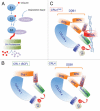CRL4Cdt2: master coordinator of cell cycle progression and genome stability
- PMID: 21212733
- PMCID: PMC3025761
- DOI: 10.4161/cc.10.2.14530
CRL4Cdt2: master coordinator of cell cycle progression and genome stability
Abstract
Polyubiquitin-mediated degradation of proteins plays an essential role in various physiological processes including cell cycle progression, transcription and DNA replication and repair. Increasing evidence supports a vital role for the E3 ubiquitin ligase cullin-4, in conjunction with the substrate recognition factor Cdt2 (CRL4Cdt2), for the degradation of multiple cell cycle-regulated proteins to prevent genomic instability. In addition, it is critical for normal cell cycle progression by ensuring the timely destruction of various cell cycle proteins whose deregulated expression impairs cell cycle progression. Here, we summarize our current knowledge about the various roles of the CRL4Cdt2 E3 ubiquitin ligase, and how its activity contributes both to the preservation of genome integrity and to normal cell cycle progression, and how its deregulation may contribute to human cancer.
Figures



References
-
- Amir R, Ciechanover A, Cohen S. The ubiquitin-proteasome system: the relationship between protein degradation and human diseases. Harefuah. 2001;140:1172–1176. - PubMed
-
- Glickman MH, Ciechanover A. The ubiquitin-proteasome proteolytic pathway: destruction for the sake of construction. Physiol Rev. 2002;82:373–428. - PubMed
-
- Kornitzer D, Ciechanover A. Modes of regulation of ubiquitin-mediated protein degradation. J Cell Physiol. 2000;182:1–11. - PubMed
-
- Ciechanover A, Schwartz AL. Ubiquitin-mediated degradation of cellular proteins in health and disease. Hepatology. 2002;35:3–6. - PubMed
-
- Grillari J, Grillari-Voglauer R, Jansen-Durr P. Post-translational modification of cellular proteins by ubiquitin and ubiquitin-like molecules: role in cellular senescence and aging. Adv Exp Med Biol. 694:172–196. - PubMed
Publication types
MeSH terms
Substances
Grants and funding
LinkOut - more resources
Full Text Sources
Medical
